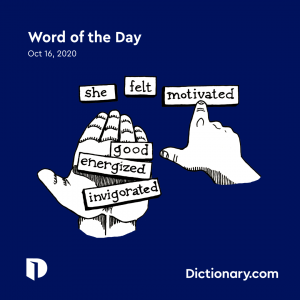Word of the Day
More about mardy
Mardy is a British dialect (the North and Midlands) adjective and noun meaning “spoiled, spoiled child; childish sulkiness.” Mardy is most likely formed from the adjective marred “damaged, spoiled,” originally the past participle of mar, and the native adjective suffix –y. Mardy entered English in the second half of the 19th century.
how is mardy used?
There was a fleeting reference to the Doctor being in a “mardy mood” during the opening scene. Otherwise, no sign.
Pa would rise before daylight had kicked nighttime into touch. He’d return after dark, when he’d be mardy until he’d eaten.
mardy


ambivert
noun
Psychology.
one whose personality type is intermediate between extrovert and introvert.
More about ambivert
Ambivert, literally “turned both ways,” is a term used in psychology, meaning “one whose personality type is between introvert and extrovert.” Ambivert is based on Latin elements: the prefix ambi– “both, on both sides, around” (as in English ambient “surrounding, encompassing” and ambiguous “open to several interpretations”), and the suffix –vert, extracted from the verb vertere “to turn” (as in English convert “to turn completely,” and divert “to turn aside, deflect”). Ambivert, first recorded in 1927, is modeled on the somewhat earlier words introvert (1916) and extrovert (1918).
how is ambivert used?
Drew was more of an ambivert. He wasn’t as outgoing as his younger sister, but he wasn’t as reserved as his parents either.
A well-developed ambivert, he [Abraham Lincoln] could hold complexity and contradiction to stand firmly behind words America desperately needed ….
ambivert


diction
noun
style of speaking or writing as dependent upon choice of words.
More about diction
Diction ultimately comes from Latin dictiō (inflectional stem dictiōn-) “speaking, act of speaking, (oracular) utterance, word, expression,” a derivative of the verb dīcere “to say, speak, talk.” Dictiō, though a word in general Latin vocabulary, is naturally connected very closely with rhetoric and law, two very important professions among the Romans. Dīcere, earlier deicere, comes from the very common Proto-Indo-European root deik- (also deig-), dik- (dig-) “to show, point out,” and appears in Greek deíknysthai “to show, point out,” Gothic ga-teihan “to show, make clear,” and German zeigen “to show.” The 13th-century English philologist, grammarian, and university professor John of Garland coined the word dictiōnārius as the title for one of his Latin textbooks in which he grouped lexical items thematically. Garland explained that his dictiōnārius was not based on the sense of dictiō as a single word, but dictiō in the sense of connected discourse. In the 14th century the Benedictine monk, translator, and encyclopedist Pierre Bersuire used the term dictiōnārium as the title for an alphabetical encyclopedia of the Vulgate (St. Jerome’s version of the Latin Bible, completed at the end of the 4th century). By the 15th century, dictiōnārium acquired the generalized sense “alphabetized wordbook.” Diction entered English in the 15th century.

how is diction used?
She did more than powder noses; she advised on diction and apparel and helped commanders in chief put their best selves forward for television.
His diction mirrors the emotional gravity in each scene, which, combined with raw honesty, is what makes his writing so relatable.
diction





